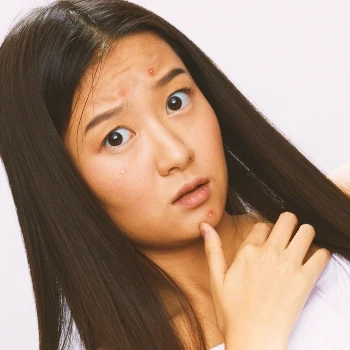Over 50 million people in the USA are affected by acne, and some reports claim that multivitamins can cause acne or make acne worse if you're already prone to it.
As a medical doctor, this is a situation that concerns me.
So, I checked what the scientific studies say and consulted with a partner dermatologist to bring you the complete list of multivitamin ingredients that cause acne and components that can help you battle this annoying issue.
Quick Summary
- Multivitamins can cause acne as they contain minerals and vitamins, making matters worse if you have acne-prone skin.
- Vitamin B12, biotin, and whey protein are the multivitamins that can cause acne.
- Approximately 50 million people in the USA suffer from acne, with some cases potentially linked to multivitamin use.
- I believe that while multivitamins are beneficial, it's essential to choose them wisely to avoid worsening acne conditions.
Do Multivitamins Cause Acne?

Yes, multivitamins can cause acne, especially in acne-prone skin, due to high levels of certain nutrients like vitamin B12, vitamin C, biotin, and whey protein.
That’s not all. Dietary supplements also have artificial forms or essential nutrients.
What makes matters worse is that not only can vitamin and mineral supplements have too many of the nutrients that can cause acne, but they don't have enough of the nutrients that prevent acne.
“Those with a history of acne are more prone, but I’ve seen certain vitamin Bs causing acne in those without a history, too.”
- Leslie Baumann, Board-Certified Dermatologist
Here’s the complete list of all the acne-causing and fighting multivitamin ingredients.
Multivitamins That May Cause Acne

While these are common ingredients in most multivitamins and are generally considered safe, anything in excess might trigger acne.
Vitamin B12
I've always been cautious when prescribing Vitamin B12 supplements to my patients. Despite their benefits, I learned they can disrupt skin bacteria, leading to inflammation and acne, and excess of B12 causes disruption in the skin bacteria, which is known as Propionibacterium acnes [1].
A study from the National Library of Medicine found that Vitamin B12 altered a skin gene expression, making it more likely to break out in inflammation [2].
Overdoing B12 can aggravate acne, turning small skin troubles big. Watch out: a standard multivitamin might pack 5 to 20 times the recommended 2.4mg daily B12 dose. It's crucial to monitor B12 in multivitamins, especially for acne-prone skin, to avoid stirring up more trouble.
Biotin

Whey Protein
Multivitamins That Help Fight Acne

Vitamins and minerals balance hormones and can clear acne, but they don't replace a healthy diet. Consult a nutritional therapist for diet recommendations.
I’ve talked about acne triggers; now let’s check other supplements that, together with proper nutrition, can help you fight acne.
Vitamin D
A study in PubMed found that 95% of people who suffer from acne have vitamin D deficiency [3]. Did you know? Every root cause of acne is connected to vitamin D. People who don’t or can’t get enough sun exposure can use vitamin D supplements.
Pro tip: use multivitamins that contain vitamin D3, as this is the body’s preferred form of vitamin D.
Note: If you suffer from hormonal acne, don’t overdo vitamin D intake, as it’s the primary hormone that stimulates testosterone, which causes hormonal flares.
Zinc

Zinc is a mineral that’s a great addition to the skincare routine.
It decreases oil glands production and helps with:
- Preventing dead skin cells from clogging up the pores
- Transporting vitamin A to skin
- Reducing inflammatory acne
Here’s what scientific evidence says:
- Zinc reduced acne and pimples by 33% after 6 weeks [4]
- Zinc reduced mean acne score from 100% to 15% after 12 weeks [5]
It also helps if you ingest too much iodine. You may notice acne breaking out because iodine is a common multivitamin ingredient. Zinc can help clear acne.
Because getting zinc through diet is difficult, you can supplement with oral antibiotics or topical treatment.
Related Articles:
Omega-3 Fatty Acids
Having too many omega-6 fatty acid supplements and not enough omega-3 can create an imbalance on your immune system. What happens is that the body can see acne infection as a major threat, which makes the area swell and become red.
The problem happens because it’s easy to get omega-6 fatty acids through foods, but it’s not easy to get omega-3, which is mainly found in wild fish such as salmon and mackerel.
Experts who provide medical advice say that fish oil supplements are a good thing to use, as they help to have skin cleared of inflammation and acne.
Personalized Vitamin Regimens to Prevent Acne
While discussing with my dermatologist partner, he found that you can use personalized vitamin regimens based on individual skin types and conditions to prevent acne.
Here's what you could use depending on your skin:
- For oily skin, a regimen high in vitamins A and D can help regulate sebum production and maintain skin health.
- For dry skin, vitamins E and C are beneficial for their hydrating and antioxidant properties, helping to nourish and protect the skin.
- Combination skin benefits from a balanced mix of vitamins, focusing on hydration and oil control.
FAQ
Why Multivitamins Give Me Acne?
Multivitamins give you acne due to iodine-high ingestion. While it's a common ingredient, it causes whitehead influx and acne due to oil gland inflammation.
Should I Take Vitamins If I Have Acne?
Yes, you should take vitamins if you have acne. The ingest can rebalance hormone levels and fight the skin condition. Still, you should always consult with a dermatologist before proceeding.
References:
- https://www.science.org/doi/10.1126/scitranslmed.aab2009
- https://www.ncbi.nlm.nih.gov/pmc/articles/PMC6049814/
- https://pubmed.ncbi.nlm.nih.gov/26413187/
- https://pubmed.ncbi.nlm.nih.gov/82356/
- https://jamanetwork.com/journals/jamadermatology/article-abstract/536705
About The Author
You May Also Like







Who knew something as simple as a multivitamin could mess with my skin? Thanks for the heads-up